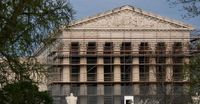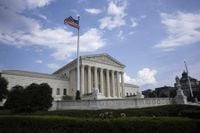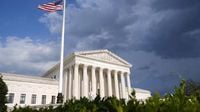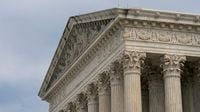The Supreme Court has agreed to hear arguments regarding President Donald Trump’s controversial executive order aimed at curbing birthright citizenship, a fundamental aspect of American law that automatically grants citizenship to anyone born on U.S. soil. The high court's decision to schedule oral arguments for May 15, 2025, comes amidst a backdrop of significant legal challenges and nationwide injunctions that have kept the order on hold since it was issued on Trump’s first day back in office this year.
On April 17, 2025, the Supreme Court announced it would entertain the Trump administration’s emergency request to narrow the scope of nationwide blocks imposed by various federal judges. These judges have ruled that the executive order, which seeks to deny citizenship to children born in the United States to parents without permanent legal status, is inconsistent with the 14th Amendment’s Citizenship Clause. This amendment, ratified shortly after the Civil War, guarantees citizenship to all persons born or naturalized in the U.S., regardless of their parents' immigration status.
Trump’s push to end birthright citizenship has been a cornerstone of his administration's broader immigration reform agenda. In his executive order, Trump asserts that children of noncitizens are not “subject to the jurisdiction” of the United States, a key phrase in the 14th Amendment that he argues excludes them from automatic citizenship. The former president has characterized birthright citizenship as a “priceless and profound gift” that should not be easily granted, arguing that the amendment's original intent was tied to the post-Civil War era and the context of slavery.
In a statement following the Supreme Court’s announcement, Trump expressed optimism about the upcoming arguments, stating, “I think the case has been so misunderstood.” He emphasized that the 14th Amendment was ratified in a specific historical context and suggested that its interpretation should evolve accordingly. Trump’s perspective reflects a belief among some of his supporters that the amendment has been misapplied to grant citizenship to the children of undocumented immigrants.
However, opponents of the executive order, including state attorneys general and civil rights organizations, have mounted legal challenges arguing that birthright citizenship cannot be altered or revoked at the discretion of a single individual. New Jersey Attorney General Matthew J. Platkin, who is co-leading one of the lawsuits against the order, stated, “Birthright citizenship cannot be turned on or off at the whims of a single man.” Platkin and others contend that the right to citizenship is a fundamental principle that should remain intact regardless of political changes.
The legal landscape surrounding this issue has been complex, with federal judges in Maryland, Massachusetts, and Washington State issuing temporary injunctions that have blocked the enforcement of Trump’s order nationwide. These judges have pointed to longstanding Supreme Court precedent affirming birthright citizenship, particularly the landmark 1898 case of United States v. Wong Kim Ark, which upheld the principle that anyone born in the U.S. is automatically a citizen.
As the Supreme Court prepares to hear arguments, the Trump administration has urged the justices to limit the application of these injunctions to the specific parties involved in the lawsuits, rather than allowing them to block the policy nationwide. In their emergency appeal, the administration argued that such broad injunctions overstep judicial authority and impede the executive branch's ability to govern effectively. Solicitor General D. John Sauer emphasized that “years of experience have shown that the Executive Branch cannot properly perform its functions if any judge anywhere can enjoin every presidential action everywhere.”
Legal experts have warned that a ruling in favor of the Trump administration could set a precedent that undermines the authority of lower courts and alters the balance of power between the branches of government. Critics of the executive order assert that allowing the administration to enforce its citizenship policy could create a confusing patchwork of citizenship rules that vary by state, undermining the uniformity that the 14th Amendment was designed to ensure.
Birthright citizenship is not only a legal issue but also a deeply emotional one for many families across the country. According to a Migration Policy Institute analysis, in 2018, there were approximately 4.4 million U.S.-born children with at least one parent who is an unauthorized immigrant. This demographic represents a significant portion of the population that could be directly affected by changes to birthright citizenship policies.
In 2021, 21% of U.S. births were attributed to immigrant parents, a figure that has remained stable over the past two decades. The implications of altering birthright citizenship would not only affect individual families but could also reshape the demographic landscape of the nation.
As the Supreme Court prepares for the May arguments, attention will be focused not only on the specifics of Trump’s order but also on the broader implications of judicial authority and the future of citizenship in America. This case could redefine the relationship between state and federal powers and set a precedent for how executive orders are challenged in courts across the country.
Legal analysts have noted that the outcome of this case may resonate far beyond the issue of birthright citizenship, potentially affecting a range of Trump administration policies that have faced similar legal challenges. As the justices deliberate, the nation watches closely, aware that their decision may have lasting ramifications for generations to come.








